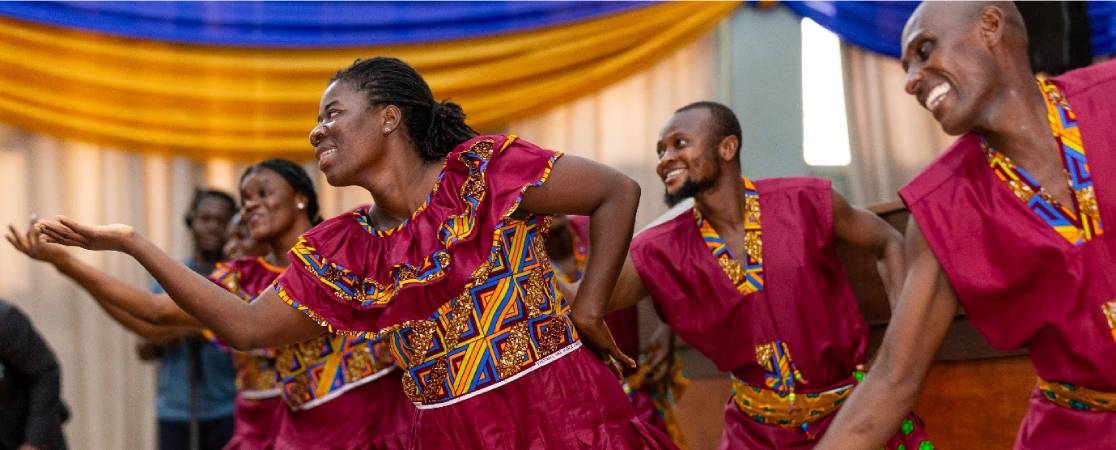
University of Ghana Business School (UGBS) holds a Durba in Celebration of the 44th Management Day
The University of Ghana Business School (UGBS) celebrated its 44th Management Day with a grand durbar on 5 th June 2024 at the R.S. Amegashie Auditorium. The event brought together dignitaries, alumni, faculty, staff, industry professionals, and students to discuss the theme "Economic Resilience of Ghanaian Households and Businesses in an Era of Domestic Debt Exchange Programme (DDEP)".
The Dean of UGBS, Prof. Justice Bawole, warmly welcomed the gathering while the Provost of the College of Humanities, Prof. Daniel Frimpong Ofori, chaired the event and represented the Vice-Chancellor of UG, Prof. Nana Aba Appiah Amfo. Prof. Ofori applauded UGBS for fostering mutual interaction with experienced communities in business administration and practice. He noted that UGBS has lived by its vision of becoming a world-class business school, developing global leaders.
“The theme for this year's Management Week celebration is not only relevant and topical but timely. By stimulating discussions on how best to tackle this critical concern, we can find the best solutions. This makes the theme for this year's Management Week celebration, especially relevant.” He stated.
Mr. Philip Amoateng, Director for Telecel Cash and Digital Transformation, spoke on leveraging Fintech to enhance financial resilience. According to him, FinTech is improving the financial lives of people in rural areas and enabling savings. He noted that these tools have not only simplified life and spending but also redefined wealth management finances. He encouraged everyone to be part of FinTech.

Mr. Sam Osew Kwatia, Group Chief Finance Officer for Broadspectrum Limited, discussed financial resilience for individuals and households, emphasising the need for savings and financial literacy. He also discussed financial literacy and continued with how businesses can be financially resilient. He mentioned partnering with UGBS and supporting in ways that they can forever. “Now you are only financially resilient when you can meet your recurring expenses”. He concluded.
A panel discussion followed, featuring Prof. Vera Ogeh Fiado, and Prof. Elikplimi K. Agbloyor, Department of Finance, and Prof. Robert Darko Osei, the Dean of School of Graduate Studies. Prof. Agbloyor provided an in-depth overview of the Domestic Debt Exchange Programme (DDEP), explaining its relevance and impact on Ghanaian households and businesses. He noted that households with a minimum of six months' salary in savings are less likely to be vulnerable to financial constraints.
Prof. Fiado emphasised that businesses are disproportionately affected, leading to constraints on individuals. She urged individuals to understand the implications of DDEP and take necessary actions to mitigate its effects on the nation's economy. She stressed that the demand for dollar hoarding is contributing to the dollar's appreciation in the country, so once people understand the impacts, they will stop hoarding dollars and save the nation.
Prof. Darko Osei encouraged individuals to prioritise financial resilience and literacy. He explained that some people see DDEP as a sudden debt default, which affects households that rely on investment yields. He stressed the importance of responsible financial practices to mitigate the effects of DDEP.
In his closing remarks, Prof. Ofori highlighted the importance of financial literacy and economic resilience, encouraging individuals to minimise their demands and be financially resilient. He concluded by saying, “I therefore look forward to seeing UGBS become more relevant as it continues to produce more leaders whose actions impact, UGBS that form strong affiliations with world-renowned institutions to increase its credibility, reality, and I particularly look forward to a future where UGBS has emerged as an icon in the leadership world and the point of reference.”
The event concluded with an open forum where panellists addressed questions and concerns from the audience. The celebration emphasised the need for financial literacy, economic resilience, and responsible financial practices in Ghanaian households and businesses.